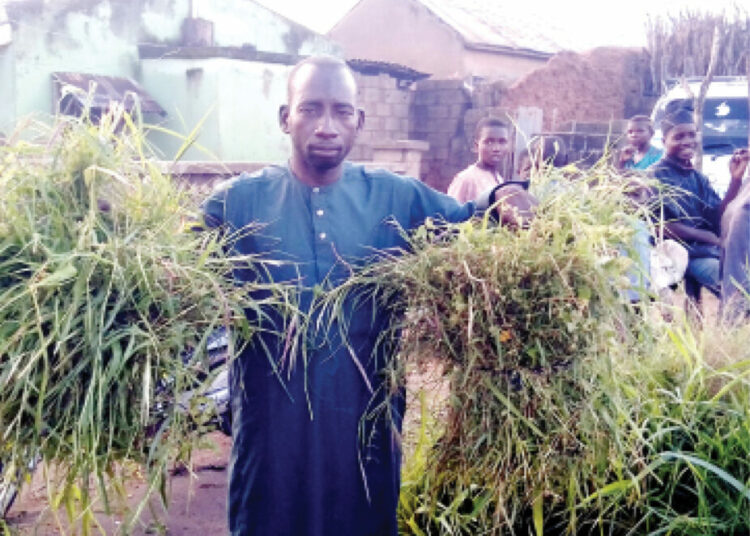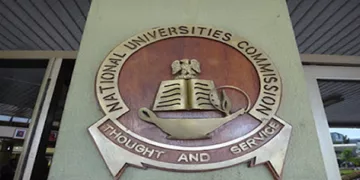Across busy points like Kofar Fada, Kofar Wambai and the CBN Roundabout on Bauchi State , they rise before dawn to harvest wild grass, bundle it, and haul it into town transforming a humble, overlooked plant into daily income.
Their trade may be simple, but behind each heap of green lies a story of resilience: young men feeding the city’s livestock, easing pressure on overgrazed fields, and keeping their families afloat in a climate that grows harsher by the year.
The smell of fresh vegetation hangs in the air as hawkers stack neat bundles of grass along the road . Their green mounds glow under the fading sun. Motorcyclists pull over to haggle, cattle owners bargain, and the grass sellers hands calloused, smiles worn, quietly tally the day’s hard-earned income.
What many ignore as routine is, in fact, a quiet lifeline feeding families and easing environmental strain as climate challenges intensify.
Among the hawkers is 45-year-old Kabiru Tanko, who has made the trade the backbone of his family’s livelihood. Every morning, he heads into the bush with a sickle to cut grass, which he later sells to livestock owners and other customers. Each bundle goes for N1,000, and by the end of the day, Tanko earns about N5,000 in profit, enough to provide for his wife and two children.
“This is my work. Grass feeds my family, he said, arranging his bundles at Kofar Wambai, where the green piles attract steady buyers from morning until night
At a glance, the scene appears ordinary: men selling grass by the roadside. But behind it lies a complex network of sourcing, transportation and trade.
Misbahu Isah, 27, the leader of the grass hawkers at Kofar Wambai, has spent 15 years in the business. He and his colleagues source grass from distant places like Inkil, Kajitu, Bayara, Durum, Dungulbi and even abandoned graveyards where wild grass flourishes.
He said,“We can cut up to 50 large heaps a day,” he explains, “and then partition them into smaller bundles for sale. It’s not easy. We risk snake bites and other dangers in the bush.”
Despite these challenges, Misbahu and his team take pride in their work. “We keep our market area clean every day,” he adds. “People look down on us because we sell grass, but this is what keeps our homes running.”
While some passersby view them as mere hawkers, their role in the city’s agricultural and environmental ecosystem is significant.
Zulkarna’aini Haruna, a resident of Tafawa Estate, rides to Kofar Wambai daily to buy grass for his livestock. “I spend about N3,000 every day,” he told LEADERSHIP, loading heaps of grass onto his motorbike.
He added, “Without them, I couldn’t feed my cattle and ducks. They make livestock rearing easier for people like me living in the city.”
To Shamsu Ibrahim of Abujan-Kwata, the hawkers’ trade means he can practice close grazing, keeping his cattle near home instead of wandering into open fields. “They help me raise cattle in my backyard,” he emphasised.
“I spend N5,000 daily, but it’s better than taking animals far away. It helps prevent overgrazing.”
But the grass hawkers themselves are not immune to the effects of a changing climate. The availability of fresh grass depends on rainfall and vegetation cycles, both increasingly unpredictable in Bauchi.
Kabiru Jibrin, 20, knows this struggle all too well. Even during the harsh dry season when grass turns brown, he keeps working. “It’s hard to find green grass,” he said. “Sometimes we trek for hours before we find enough to cut. But I can still make about N4,000 a day.”
Environmental experts say this practice indirectly supports sustainability. By reducing the need for open grazing, the hawkers help curb deforestation, soil erosion, and farmer-herder conflicts, all of which are aggravated by climate change.
An environmental expert, Yusuf Bello of Abubakar Tatari Ali Polytechnic, Bauchi, said the grass hawkers represent a unique intersection of livelihood and ecology. “Their work reflects how local economies adapt to environmental realities,” he explains. “Grass hawking, if managed sustainably, can help control bush overgrowth, reduce the risk of wildfires and support livestock production without heavy ecological footprints.”
He adds that the trade provides an opportunity for the state to explore sustainable vegetation management. “With proper training and government support, these hawkers could be integrated into green jobs initiatives, such as organised fodder farming, composting, or reforestation programs,” Bello suggests.
Despite their contribution to both economy and environment, grass hawkers operate on the margins of society. Misbahu says they face not only physical risks but also social stigma. “People laugh at us,” he said quietly. “They call us ‘grass men’ like it’s an insult. But this grass feeds our families and helps the city’s livestock owners.”
Transportation costs also eat deep into their income. Many rely on bicycles or commercial vehicles to move bundles from rural areas to the city, often spending nearly half their daily profit on transport. “If we had a small truck or tricycles, it would help us a lot,” Misbahu explained. “We need empowerment, not pity.”
The hawkers also advocate for protective gear to guard against snake bites and insect attacks, common hazards during their foraging trips.
He appealed to the Bauchi State government to recognise and support their efforts as part of broader environmental sustainability programs.
As the evening breeze rustles through heaps of grass at Kofar Fada and Gombe Road, the hawkers continue their work, shouting prices, tying bundles, negotiating with buyers. Few notice that in their daily hustle lies a delicate balance between human need and ecological care.
By cutting and selling grass, they help prevent bushfires, which release carbon into the atmosphere. Their trade also supports livestock rearing in confined spaces, reducing the pressure on open pastures and forests, a small but meaningful contribution to climate resilience.
As dusk deepens, Misbahu Isah packs up his unsold heaps. Tomorrow, before sunrise, he will head back to the bush, his routine as steady as the seasons he depends on. He knows little about “climate change” or “sustainability,” yet his work embodies both concepts.
“The land gives us grass,” he said simply, tightening the rope on his bicycle. “As long as we treat the land well, it will keep giving.”
In Bauchi, the story of these grass hawkers is one of resilience, ordinary men turning green fields into daily bread, bridging survival and sustainability in a changing world. They may not carry the language of climate science, but in their modest heaps of grass lies an unspoken truth: they are keeping both their families and the environment alive, one bundle at a time.





